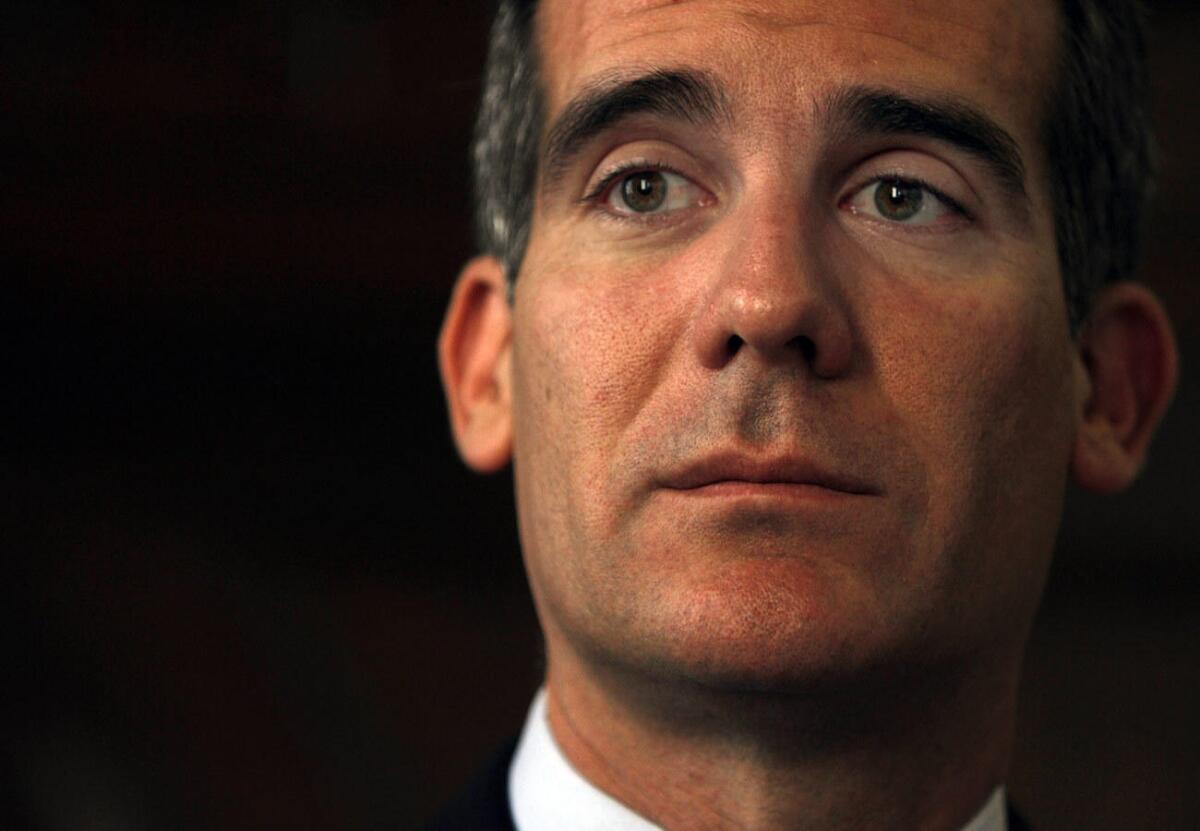Mayor Garcetti hopes to pass $13.25 minimum wage in L.A. by early 2015

- Share via
Mayor Eric Garcetti’s motivations for backing a $13.25 minimum wage in Los Angeles are manifold – other localities and President Obama are pushing similar measures, intense poverty levels are stressing city services and lack of spending power is hampering the local economic recovery.
But, while meeting with Los Angeles Times editors and reporters Thursday, Garcetti said his interest in the issue stems “first and foremost” from “a moral imperative.”
“We’re seeing that more and more companies are moving to the minimum wage as their main workers’ wage, and as a result, that has kind of undermined that promise in America that if you work hard, you will be able to support yourself,” the mayor said.
On Labor Day, Garcetti proposed gradually raising the minimum wage in the city from the state minimum of $9 an hour to $10.25 next year, $11.75 in 2016 and $13.25 in 2017. He said sympathetic City Council members are likely to introduce the proposal in a motion in the next few weeks, with the goal of passing the increase around January.
Similar efforts have been made in other California cities, including San Diego and San Francisco. This week the West Hollywood and Santa Monica councils agreed to take the first steps toward considering a minimum wage increase.
Low pay tamps down local spending and buying power, Garcetti told The Times. The cost to government is also high, increasing demand for food stamps, subsidized housing and other public services.
“We don’t have people eating out and we don’t have people shopping,” he said. “They’re deciding between paying off the phone bills and floating more debt or whether or not they can afford the air conditioning.”
Raising the minimum wage, he said, could alleviate some of the most “devastating” effects of poverty: social problems such as high crime and poor education. Parents are often both working full time and often multiple jobs each, he said.
“How can they sit down for homework with their kids, or get the skills to get higher wages, when they can’t bridge the digital divide because they can’t sit down to learn from their kids how computers work,” Garcetti said.
Higher wages, he said, could help revitalize shopping districts in impoverished areas as residents spend their expanded earnings in local shops.
Asked about businesses – especially manufacturers – fleeing the city for communities with a lower minimum wage, Garcetti said he wasn’t concerned.
“We have more people who would like to be here than we have space for,” he said. “There’s a shortage of industrial land in the city of L.A., and we have good companies that pay well over the minimum wage that we can’t find space for. So if that space is ever to be freed up, I’m not worried that we won’t be able to fill that with higher wage jobs.”
Restaurants employ a plurality of workers who would be affected by a minimum wage increase to $13.25 an hour, according to Michael Reich, a UC Berkeley economist who was part of a team asked by Garcetti to study the feasibility of his proposal.
Reich, who accompanied Garcetti to The Times, said recruiting new employees would be easier for eateries, productivity would increase and absenteeism would decline should the minimum wage rise.
“There are going to be more workers who are going to want to work for you, and they’re going to stay longer,” said Reich, the director of UC Berkeley’s Institute for Research on Labor and Employment. “What I’ve found is that restaurants experience a lot easier time recruiting workers. It reduces the number of vacancies, not jobs.”
Reich has found in a series of recent studies that raising the minimum wage has very little effect on employment or hours for workers.
By comparing adjoining counties with varying minimum wages across the country, he and other researchers have concluded that businesses don’t lay off workers and don’t substantially raise prices because of higher labor costs.
What makes the minimum wage proposal in Los Angeles so different from other cities is how much of the workforce could be affected – 37% of private-sector workers, far higher than 25% to 30% in other cities, Reich said.
“On the spending side, there will be an impact,” he said. “That affects the city as a whole, and it even affects the restaurant industry positively, because some of that money will be spent on local restaurants.”
Minimum wage is a controversial issue, with many studies alleging that increases could threaten employment and crush small businesses.
But Garcetti defended his use of the UC Berkeley findings by saying he wasn’t trying to prove any particular point.
“I wasn’t looking for an ideologue,” he said. “You can find people on global warming who are on the other side of the story, but I think there’s a consensus increasingly.... I trusted that this was the right place to be.”
On Twitter: @tiffhsulatimes, @c_kirkham
More to Read
Inside the business of entertainment
The Wide Shot brings you news, analysis and insights on everything from streaming wars to production — and what it all means for the future.
You may occasionally receive promotional content from the Los Angeles Times.










